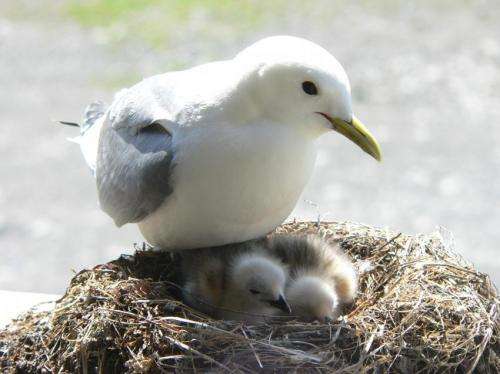Love at first smell: Can birds choose mates by their odors?

Mate choice is often the most important decision in the lives of humans and animals. Scientists at the Konrad Lorenz Institute of Ethology at the Vetmeduni Vienna have found the first evidence that birds may choose their mate through odor. The researchers compared the preen gland chemicals of black-legged kittiwakes with genes that play a role in immunity. Kittiwakes that smell similarly to each other also have similar genes for immunity. Since the birds prefer to mate with unrelated mates, the scientists have now found the likely mechanism by which they recognize relatedness. The scientists published their findings in Nature's Scientific Reports.
It has long been understood that reproducing with close relatives may have profoundly negative effects on offspring. It is therefore not surprising that biologists have discovered in some species that breeding individuals have evolved ways to detect their genetic similarity with those of prospective partners. Over 20 years ago it was discovered that female mice were able to choose unrelated over related males as mates. Females achieved this by comparing the smell of the urine of each male and comparing it with their own odors. Amazingly, the urine odors reflected the genetic composition of each mouse. More specifically, the odors were correlated with a special group of genes called the "major histocompatiabilty complex", or MHC, which helps individuals resist diseases. Thus, by pairing with MHC-dissimilar mates, breeders produce offspring with a more diverse collection of disease-resistant genes.
This discovery in mice was followed by similar findings in other mammals. More recently it has been shown that birds in several species also avoid breeding with MHC-similar mates. This poses a mystery. Whereas smell is a very well developed sense in mammals, it has long been thought that birds lack such keen olfactory abilities. Although a growing body of research is showing that birds can discriminate odors more than previously thought, none had shown that birds can do as mammals and use odor to compare their MHC composition with that of prospective mates. This mystery appears to have been solved by a group of researchers from Austria and France. Team leader Richard H. Wagner and behavioral geneticist Wouter van Dongen of the Konrad Lorenz Institute of Ethology, a part of the Veterinary Medicine University Vienna, have been collabortating with French colleagues on a long-term study of a cliff-nesting gull, the black-legged kittiwake, breeding in Anchorage Bay, Alaska.
When birds groom themselves with their bills, they spread chemical compounds from their preen glands throughout their plumage. These chemicals produce odors that appear to be unique to each individual, providing an olfactory fingerprint. The team suspected that, just as in mammals, these odors may be used by kittiwakes to assess their relatedness to other individuals.
To test this idea, the researchers collected both DNA samples and preen gland odor samples from nesting kittiwakes. The project then entailed two kinds of laboratory work: while Sarah Leclaire at the University of Toulouse conducted the analyses of the preen gland chemicals to characterise the odor signatures of each individual, van Dongen analyzed the MHC of the kittiwakes in the Vienna lab. The team had previously discovered that kittiwakes avoided pairing with relatives, but the mechanism by which the birds recognized their relatedness to each other had remained unknown until now. Their new finding is that individual kittiwakes that smell similarly to each other (i.e. have similar preen gland chemicals) also have similar MHC genes. Closer relatives therefore have more similar odors than distantly related individuals. This suggests that birds may be able to compare their own odor with those of potential mates, and to choose unrelated individuals as breeding partners. Quips ornithologist Wagner, "the more research that is performed on smell, the more it appears that anything mammals can do, birds can do too." The new findings, moreover, open the door for further work linking mate choice and disease-resistance in birds.
More information: Preen secretions encode information on MHC similarity in certain sex-dyads in a monogamous seabird, by Sarah Leclaire, Wouter F. D. van Dongen, Steeve Voccia, Thomas Merkling, Christine Ducamp, Scott A. Hatch, Pierrick Blanchard, Étienne Danchin & Richard H. Wagner, Scientific Reports. DOI: 10.1038/srep06920
Journal information: Scientific Reports

















